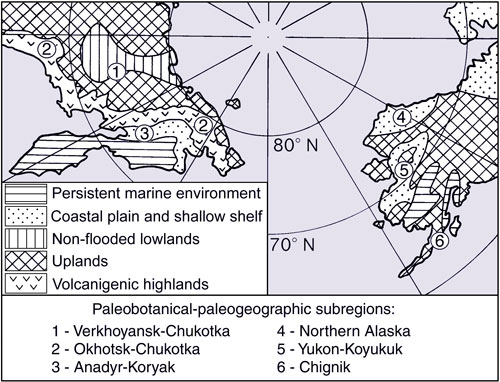Correlations
| North Pacific | AKSR-NASR | Anadyr-Koryak | Verkhoyansk-Chukotka | Okhotsk-Chukotka | N. Alaska | Yukon | Chignik |
|---|---|---|---|---|---|---|---|
| Phytostratigraphy | |||||||
The Verkhoyansk-Chukotka SubregionThe Verkhoyansk-Chukotka Subregion was characterised in Albian–Late Cretaceous times by an intracontinental low to hilly plain sheltered from marine transgressions, where non-marine sedimentation and coal accumulation took place in several isolated basins. The VCSR floras were inherited from those of the Buor-Kemus phase, being dominated by ferns and gymnosperms, but lacking angiosperms or containing rare angiosperm forms. In addition to the Buor-Kemus regional flora, the Vstrechnaya (Turonian–Coniacian), Chauna-type (Turonian–Coniacian), and Arkagala (probably late Turonian–Senonian to Campanian) floras are known in the subregion. The Vstrechnaya Flora from the Moma–Zyrianka Depression (Geologiya…, 1970; Vassilevskaya, 1987), which is not taxonomically diverse, is dominated by angiosperms (Trochodendroides and large-leaved Ettingshausenia inclusive). The Vstrechnaya flora is most similar to the Penzhina and Kaivayam floras of the AKSR and Kaolak flora of the NASR and therefore is determined to be Turonian–Coniacian in age. Belyi (1997a, 1997b) regarded a very impoverished taphoflora of the Mangazeya volcanic field in the middle reaches of the Bolshoi Anyui River (Ainakhkurgen Depression) as a flora of the Chauna type. This taphoflora lacks angiosperms and includes the characteristic fern genus Tchaunia and the czekanowskialean plant Phoenicopsis. |
Interactive map showing the main paleobotanical-paleogeographic subregions in Northeastern Russia. |
The Arkagala Flora (Samylina, 1988) from the Arkagala and Dolginsk formations of the Arkagala coal field (upper reaches of the Kolyma River) is dominated by conifers, both in taxonomic diversity and number of individual specimens. Co-dominant taxa are Phoenicopsis species and remains of the aquatic angiosperm Quereuxia. Except for Quereuxia, angiosperms are extremely rare, usually occurring in very small numbers, although the overall taxonomic diversity of these plants is significant. The most striking feature of the Arkagala flora is the unusual combination of its general “Mesophytic” aspect with the presence of typically early Cretaceous plants, and the fact that conifers and angiosperms of the flora belong to genera which became abundant and diverse in latest Cretaceous and Cenozoic times. Such a taxonomic mix together with available palynological data (Markevich, 1989, 1995) suggest a late Turonian–Senonian (Campanian) age for the Arkagala Flora,
It therefore appears that the Chauna and Arkagala floras of the VCSR are dominated by ancient ferns and gymnosperms. However, in the Turonian–Coniacian these floras coexisted with the angiosperm-dominated Vstrechnaya flora, which is comparable with angiosperm-rich floras of the AKSR and NASR.

